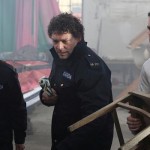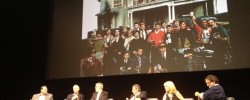
Review: Citadel (2012)
Cast: Aneurin Barnard, James Cosmo, Wunmi Mosaku
Director: Ciarán Foy
Country: Ireland | UK
Genre: Drama | Horror | Thriller
Official Trailer: Here
Editor’s Note: Citadel opens in North American theatres tomorrow
For as long as there have been films, there have been films mistrustful of the city. Cinema, after all, has since its birth been tied to modernity: the probing dissection of modern civilisation’s cornerstones is inherent in the medium’s every aspect. With the evolution of the city and the society it contains has come the evolution of its cinematic representation, from the dystopian sci-fi of Metropolis to the smoke-shrouded bleakness of film noir and beyond. Citadel, the feature debut of Irish writer/director Ciarán Foy, places the city in the frightening context of a world post-economic crash. His protagonist is Tommy, a new father left agoraphobic in the wake of his wife’s death at the hands of demented inner-city youths, staunchly determined to escape the terror of his urban hell.
In the foreboding framing of his interior shots, in the ominousness of his atmosphere, in every nervous nuance of Aneurin Barnard’s powerfully meek performance, the fragile mentality of this protagonist finds searing cinematic portrayal.
 Tommy’s fears find striking reality in Foy’s own affliction: a former sufferer of agoraphobia himself, he makes the character’s utter, unshakeable terror just as oppressive for us as for him. In the foreboding framing of his interior shots, in the ominousness of his atmosphere, in every nervous nuance of Aneurin Barnard’s powerfully meek performance, the fragile mentality of this protagonist finds searing cinematic portrayal. The towering apartment blocks which populate the skyline of Foy’s unnamed city resemble those of Andrea Arnold’s Red Road—they share a Glaswegian shooting location—immensely imposing in their architectural aloofness, commanding the frame as much as they do the mind and fears of this fretful father. Cinematographer Tim Fleming makes much of the brooding shadows which engulf this desolate space, the dark bleakness of his aesthetic an appropriate mirror to the dwindling prospects left on these abandoned streets.
Tommy’s fears find striking reality in Foy’s own affliction: a former sufferer of agoraphobia himself, he makes the character’s utter, unshakeable terror just as oppressive for us as for him. In the foreboding framing of his interior shots, in the ominousness of his atmosphere, in every nervous nuance of Aneurin Barnard’s powerfully meek performance, the fragile mentality of this protagonist finds searing cinematic portrayal. The towering apartment blocks which populate the skyline of Foy’s unnamed city resemble those of Andrea Arnold’s Red Road—they share a Glaswegian shooting location—immensely imposing in their architectural aloofness, commanding the frame as much as they do the mind and fears of this fretful father. Cinematographer Tim Fleming makes much of the brooding shadows which engulf this desolate space, the dark bleakness of his aesthetic an appropriate mirror to the dwindling prospects left on these abandoned streets.
Balancing the abundant sense of weariness Citadel trades in is James Cosmo, whose performance as a cynical, world-weary priest brings welcome colour to a film otherwise steadfast in its bleakness. Determinedly gruff, his crass speech more suited to a docker than a preacher, Cosmo’s character offers the bulk of the much-needed comic relief, spouting amusing quips to offset the uneasy atmosphere of Foy’s consistently effective scares. Adept as he is at it, though, Cosmo’s is a more important role than just the provision of intermittent laughs, his character not solely restricted to tonal management. His presence as a figure representative of religion brings an intriguing—albeit only minimally explored—aspect to the film’s examination of contemporary urbanity, opening a subtle dialogue between the terrors of our modern world and the ways we manage—or indeed do not—to cope with them.
Through the harrowing emotional connotations of its leading man’s performance, sharing the trauma of his character with each pained expression, Citadel impacts on a gut level, playing on our empathic investment to amplify its ability to unnerve.
 Much as Foy’s film excels in its efforts to craft a distorted perception of society, ably adapting horror to reflect the ills of the modern world, there’s a troubling aspect to its depiction of the working class: that it’s the poorest, most disenfranchised residents of the city who constitute the monstrous others of the narrative represents a certain mistrust of the impoverished that can’t help but cast the film in a suspect socioeconomic light. Doubtlessly it’s an incidental, unintended interpretation of the film: Foy, for his part, does much to negate it, both in making Tommy himself a member of the same social class as his tormentors and in amplifying their literal monstrosity—they owe a debt to The Brood. Nevertheless, it’s a valid opposition to take to the film, and one which partly precludes total narrative committal, detracting as it does from the otherwise impressive sense of social realism that grounds this depiction of the world and distances it from the fantastic.
Much as Foy’s film excels in its efforts to craft a distorted perception of society, ably adapting horror to reflect the ills of the modern world, there’s a troubling aspect to its depiction of the working class: that it’s the poorest, most disenfranchised residents of the city who constitute the monstrous others of the narrative represents a certain mistrust of the impoverished that can’t help but cast the film in a suspect socioeconomic light. Doubtlessly it’s an incidental, unintended interpretation of the film: Foy, for his part, does much to negate it, both in making Tommy himself a member of the same social class as his tormentors and in amplifying their literal monstrosity—they owe a debt to The Brood. Nevertheless, it’s a valid opposition to take to the film, and one which partly precludes total narrative committal, detracting as it does from the otherwise impressive sense of social realism that grounds this depiction of the world and distances it from the fantastic.
The city is a scary place in a world fractured by economic panic and social disarray. In bringing his own experience and a refreshing command of horror, reliant on familiar tropes yet robust enough to circumvent the perils of their oversaturation, Foy crafts a film as frightening in its atmospherics as in the haunting social accuracies at its heart. Through the harrowing emotional connotations of its leading man’s performance, sharing the trauma of his character with each pained expression, Citadel impacts on a gut level, playing on our empathic investment to amplify its ability to unnerve. Deftly ducking from oppressive formal framing to shrewdly constructed social assessment, Foy exhibits a generic fluidity all but alien to Irish cinema and makes of his movie a rare beast: a horror film not only genuinely scary and creatively constructed, but also important, intent on inciting thought through its visceral provocation.
Related Posts
![]()
Ronan Doyle
![]()
Latest posts by Ronan Doyle (see all)
































